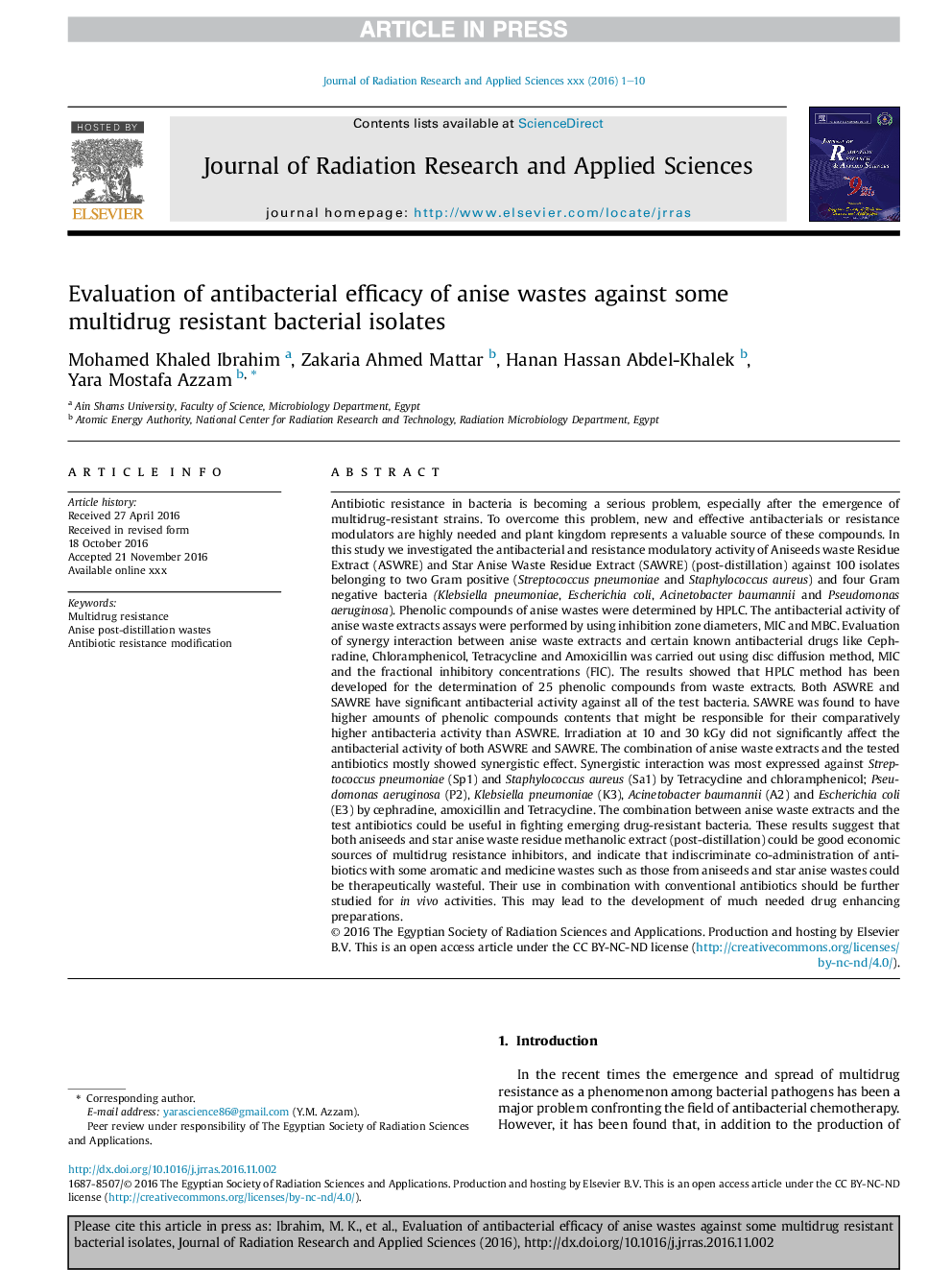| کد مقاله | کد نشریه | سال انتشار | مقاله انگلیسی | نسخه تمام متن |
|---|---|---|---|---|
| 5454509 | 1398628 | 2017 | 10 صفحه PDF | دانلود رایگان |
عنوان انگلیسی مقاله ISI
Evaluation of antibacterial efficacy of anise wastes against some multidrug resistant bacterial isolates
ترجمه فارسی عنوان
بررسی اثر آنتی باکتریال عناصر آنیس در برابر برخی از جدایه های باکتری مقاوم به چندین دارو
دانلود مقاله + سفارش ترجمه
دانلود مقاله ISI انگلیسی
رایگان برای ایرانیان
کلمات کلیدی
مقاومت چند دارویی، زباله پس از تقطیر، اصلاح مقاومت آنتی بیوتیکی،
موضوعات مرتبط
مهندسی و علوم پایه
مهندسی مواد
دانش مواد (عمومی)
چکیده انگلیسی
Antibiotic resistance in bacteria is becoming a serious problem, especially after the emergence of multidrug-resistant strains. To overcome this problem, new and effective antibacterials or resistance modulators are highly needed and plant kingdom represents a valuable source of these compounds. In this study we investigated the antibacterial and resistance modulatory activity of Aniseeds waste Residue Extract (ASWRE) and Star Anise Waste Residue Extract (SAWRE) (post-distillation) against 100 isolates belonging to two Gram positive (Streptococcus pneumoniae and Staphylococcus aureus) and four Gram negative bacteria (Klebsiella pneumoniae, Escherichia coli, Acinetobacter baumannii and Pseudomonas aeruginosa). Phenolic compounds of anise wastes were determined by HPLC. The antibacterial activity of anise waste extracts assays were performed by using inhibition zone diameters, MIC and MBC. Evaluation of synergy interaction between anise waste extracts and certain known antibacterial drugs like Cephradine, Chloramphenicol, Tetracycline and Amoxicillin was carried out using disc diffusion method, MIC and the fractional inhibitory concentrations (FIC). The results showed that HPLC method has been developed for the determination of 25 phenolic compounds from waste extracts. Both ASWRE and SAWRE have significant antibacterial activity against all of the test bacteria. SAWRE was found to have higher amounts of phenolic compounds contents that might be responsible for their comparatively higher antibacteria activity than ASWRE. Irradiation at 10 and 30 kGy did not significantly affect the antibacterial activity of both ASWRE and SAWRE. The combination of anise waste extracts and the tested antibiotics mostly showed synergistic effect. Synergistic interaction was most expressed against Streptococcus pneumoniae (Sp1) and Staphylococcus aureus (Sa1) by Tetracycline and chloramphenicol; Pseudomonas aeruginosa (P2), Klebsiella pneumoniae (K3), Acinetobacter baumannii (A2) and Escherichia coli (E3) by cephradine, amoxicillin and Tetracycline. The combination between anise waste extracts and the test antibiotics could be useful in fighting emerging drug-resistant bacteria. These results suggest that both aniseeds and star anise waste residue methanolic extract (post-distillation) could be good economic sources of multidrug resistance inhibitors, and indicate that indiscriminate co-administration of antibiotics with some aromatic and medicine wastes such as those from aniseeds and star anise wastes could be therapeutically wasteful. Their use in combination with conventional antibiotics should be further studied for in vivo activities. This may lead to the development of much needed drug enhancing preparations.
ناشر
Database: Elsevier - ScienceDirect (ساینس دایرکت)
Journal: Journal of Radiation Research and Applied Sciences - Volume 10, Issue 1, January 2017, Pages 34-43
Journal: Journal of Radiation Research and Applied Sciences - Volume 10, Issue 1, January 2017, Pages 34-43
نویسندگان
Mohamed Khaled Ibrahim, Zakaria Ahmed Mattar, Hanan Hassan Abdel-Khalek, Yara Mostafa Azzam,
